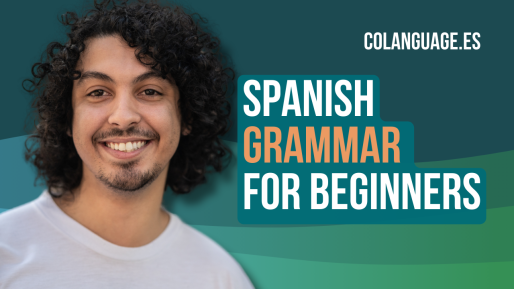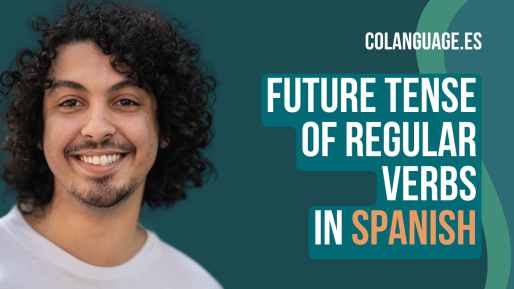Present tense: conjugation of irregular verbs in Spanish Share Copied!
Spanish
Learn the present tense of common irregular verbs in Spanish: ser, estar, hacer, tener, ver and ir, and many more.
Video
Podcast
What are irregular verbs?
In addition to regular verbs, there are also many irregular verbs that do not always follow a clear structure when conjugated.
- Tengo una hermana. (I have a sister.)Tener (To have)
- Tú ves la ciudad desde aquí. (You see the city from here.)Ver (To see)
The most common irregular verbs in Spanish
The following irregular verbs are some of the most commonly used verbs in the Spanish language.
| Spanish | English |
|---|---|
| Ser | To be |
| Estar | To be |
| Tener | To have |
| Hacer | To do, to make |
| Ver | To see |
| Ir | To go |
Notice how both the verbs "ser" and "estar" are translated to the verb "to be" in English.
Conjugation of the verb "tener" (to have)
"Tener" (to have), is a verb that is commonly used to express possession, age, and various physical or emotional states.
| Personal pronoun | Spanish | English |
|---|---|---|
| Yo (I) | Tengo un libro. | I have a book. |
| Tú (You) | Tienes un perro. | You have a dog. |
| Él/Ella (He/She/It) | Él tiene arrugas. | He has wrinkles. |
| Nosotros/-as (We) | Nosotras tenemos un coche. | We have a car. |
| Vosotros/-as (You) | Vosotros tenéis talento. | You all have talent. |
| Ellos/-as (They) | Ellas tienen sueños. | They have dreams. |
When "tener" is combined with "que", it forms the expression "tener que" (to have to). This is used to convey obligation or necessity.
Tengo que estudiar. (I have to study.)
Conjugation of the verb "hacer" (to do/to make)
The verb "hacer" has two different equivalents in English: "to do" and "to make".
| Personal pronoun | Spanish | English |
|---|---|---|
| Yo (I) | Yo hago deporte. | I do sports. |
| Tú (You) | Tú haces la compra. | You do the shopping. |
| Él/Ella (He/She/It) | Él hace un pastel. | He makes a cake. |
| Nosotros/-as (We) | Nosotras hacemos la cena. | We make dinner. |
| Vosotros/-as (You) | Vosotros hacéis teatro. | You do theatre. |
| Ellos/-as (They) | Ellas hacen la colada. | They do the laundry. |
The verb "hacer" is used to describe activities or actions.
Conjugation of the verb "ver" ("to see")
The verb "ver" (to see) is one of the most irregular verbs in Spanish.
| Personal pronoun | Spanish | English |
|---|---|---|
| Yo (I) | Yo veo el amanecer todos los días. | I see the sunrise every day. |
| Tú (You) | Tú ves el mar desde aquí. | You see the sea from here. |
| Él/Ella (He/She/It) | Ella ve las montañas desde su ventana. | She sees the mountains from her window. |
| Nosotros/-as (We) | Nosotros vemos las estrellas por la noche. | We see the stars at night. |
| Vosotros/-as (You) | Vosotros veis el atardecer juntos. | You see the sunset together. |
| Ellos/-as (They) | Ellos ven el espectáculo desde lejos. | They see the show from afar. |
The verb "ver" is used to describe visual observations and experiences.
Conjugation of the verb "ir" ("to go")
The verb "ir" is one of the most irregular verbs in Spanish. It translated to the verb "to go" in English.
| Personal pronoun | Spanish | English |
|---|---|---|
| Yo (I) | Yo voy al gimnasio. | I go to the gym. |
| Tú (You) | Tú vas al trabajo. | You go to work. |
| Él/Ella (He/She/It) | Él va a la biblioteca. | He goes to the library. |
| Nosotros/-as (We) | Nosotros vamos al restaurante. | We go to the restaurant. |
| Vosotros/-as (You) | Vosotros vais juntos. | You go together. |
| Ellos/-as (They) | Ellos van de paseo. | They go for a walk. |
When combining the verb "ir" with the preposition "a", we form an expression that indicates that the person is going to do something.
Voy a estudiar. (I am going to study.)
Key takeaways
Here is a quick summary of this lesson.
- Both the verbs "ser" and "estar" are translated to the verb "to be" in English.
- When "tener" is combined with "que", we form an expression that expresses an obligation or necessity.
- When combining the verb "ir" with "a", we form an expression that indicates that the person is going to do something.
Subscribe to our social media channels to get free daily exercises!



